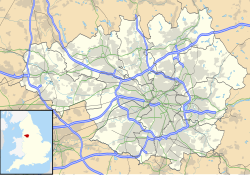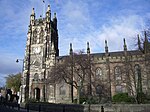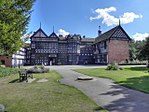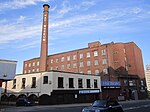St Thomas' Church, Stockport
| St Thomas' Church, Stockport | |
|---|---|
 St Thomas' Church, Stockport, from the north-east | |
| 53°24′13″N 2°09′18″W / 53.4036°N 2.1550°W | |
| OS grid reference | SJ 898 897 |
| Location | St Thomas's Place, Wellington Road South, Stockport, Greater Manchester |
| Country | England |
| Denomination | Church of England |
| Churchmanship | modern catholic |
| Website | St Thomas, Stockport |
| History | |
| Status | Church |
| Consecrated | 25 September 1825 |
| Architecture | |
| Functional status | Active |
| Heritage designation | Grade I |
| Designated | 14 May 1952 |
| Architect(s) | George Basevi |
| Architectural type | Church |
| Style | Neoclassical |
| Groundbreaking | 1822 |
| Completed | 1825 |
| Construction cost | £15,611 |
| Specifications | |
| Materials | Stone |
| Administration | |
| Province | York |
| Diocese | Chester |
| Archdeaconry | Macclesfield |
| Deanery | Stockport |
| Parish | Stockport and Brinnington |
| Clergy | |
| Rector | Revd Lynne Cullens BA (installed 18 July 2019) |
St Thomas' Church is in St Thomas's Place, Wellington Road South, Stockport, Greater Manchester, England. It is an active Church of England church in the parish of Stockport and Brinnington, in the deanery of Stockport, the archdeaconry of Macclesfield, and the diocese of Chester.[1] The church is recorded in the National Heritage List for England as a designated Grade I listed building.[2] It was a Commissioners' church, having received a grant towards its construction from the Church Building Commission.[3]
When it was built, Stockport was in the county of Cheshire, and it was the only church in that county to receive money from the first parliamentary grant administered by the Commission. It was designed by the architect George Basevi, and was one of his earlier works.[4] It is his only surviving Commissioners' church.[2]
History
[edit]The church was built between 1822 and 1825,[4] at a cost of £15,611 (equivalent to £1,620,000 as of 2023)[5], A grant of £15,636 was given by the Church Building Commission.[3][A] The contractors were Samuel Buxton and Son, and the land was given by Lady Warren-Bulkeley. The church was consecrated on 25 September 1825 as the daughter church of St Mary, Stockport.[6] At the time it was built it could seat 2,000.[7] The church was refurbished by T.H. Allen in 1881, and the chancel remodelled by Medland Taylor in 1890. The original seating has been replaced, but the galleries have survived.[6]

Architecture
[edit]Exterior
[edit]St Thomas' is a Greek Revival building,.[6] constructed in ashlar[2] Runcorn sandstone.[8] It is rectangular in plan, six bays long,[2] with a clock tower attached at the west end and a massive portico at the east, its pediment supported by six Ionic columns. When the church was begun, the portico provided a frontage onto what was then the main road. A recessed central entrance beneath the portico gives entrance to the galleries, while flanking doors lead to the vestries.[6]
Toward the top of the tower are bell openings with pediments, above which is a stage containing a clock face on each side and ball finials at the corners. The tower is surmounted by an open cupola carried on eight plain columns.[4] Basevi was unhappy with the modifications to the designs of the towers at Stockport and at St Mary's in Greenwich imposed by the Commissioners, and these were the only two churches he designed for them [9] The north and south sides of the church have two tiers of windows, the upper ones with round-arched heads, and the lower ones segmental heads.[4]
Interior
[edit]The church has galleries on three sides. They are carried on square columns, which are continued up to the ceiling in the form of fluted Corinthian columns.[4] The chancel, remodelled in 1890[6] is raised, and surrounded on three sides by a balustrade.[4] A semi-circular pulpit extends from the front of the balustrade on the north side; its lower part is in stone, and the upper in ironwork. In the corresponding position on the south side is a brass eagle lectern.[10] The marble reredos behind the high altar is carved with a depiction of the Annunciation. Above this is a copy of part of Raphael's painting Transfiguration of Jesus.[11] In the south aisle is St John's Altar, which was moved from the mission church of St John when it closed in 1941.[12] The east end of the north aisle is used as the Lady Chapel.[13] The baptistry contains an octagonal font, and is floored with a mosaic depicting fishes.[14] The stained glass dates from the late 19th century, and depicts scenes from the life of Jesus.[15]
The three-manual organ was made in 1834 by Samuel Renn. Its choir division was added in 1868 by Jardine, and the organ was cleaned and overhauled in 1890 by Alex Young.[16]

Present day
[edit]Services are held in the church on Sundays and major Christian festivals, and are usually accompanied by a robed choir.[17] Recent repairs and restorations have including replacing the roof, and repairing the clock faces and upper parts of the tower. In 2014, new washroom facilities were installed along with disabled access, at a cost of £45,000, to enable the church to be more effectively used as a venue for concerts and recitals. The upper gallery ceilings were completely restored in 2016.[18]
The church stands in the modern catholic tradition of the Church of England.[19]


See also
[edit]
- Grade I listed buildings in Greater Manchester

Exterior of St Thomas Church showing the Portico Columns - Grade I listed churches in Greater Manchester
- Listed buildings in Stockport
- List of Commissioners' churches in Northeast and Northwest England
Notes
[edit]A In some cases, as in this one, the size of the grant was greater than the actual construction cost because it also included contributions towards the cost of the site, legal fees, etc.
References
[edit]- ^ St Thomas, Stockport, Church of England, retrieved 14 December 2011
- ^ a b c d Historic England, "Parish Church of St Thomas, Stockport (1067160)", National Heritage List for England, retrieved 14 December 2011
- ^ a b Port, M. H. (2006), 600 New Churches: The Church Building Commission 1818-1856 (2nd ed.), Reading: Spire Books, p. 326, ISBN 978-1-904965-08-4
- ^ a b c d e f Hartwell, Claire; Hyde, Matthew; Hubbard, Edward; Pevsner, Nikolaus (2011) [1971], Cheshire, The Buildings of England, New Haven and London: Yale University Press, pp. 595–596, ISBN 978-0-300-17043-6
- ^ UK Retail Price Index inflation figures are based on data from Clark, Gregory (2017), "The Annual RPI and Average Earnings for Britain, 1209 to Present (New Series)", MeasuringWorth, retrieved 7 May 2024
- ^ a b c d e St Thomas' Church St Thomas' Place, Stockport Metropolitan Borough Council, archived from the original on 20 August 2011, retrieved 14 December 2011
- ^ Arrowsmith, Peter (1997), Stockport: a history, Stockport Metropolitan Borough Council, ISBN 0-905164-99-7
- ^ Davy, Christopher (1839). The Architect, Engineer, and Operative Builder's Constructive Manual (2nd ed.). John Williams. pp. xxiv–v. Retrieved 14 December 2011.
- ^ Annual Register, Volume LXXXVII. p. 305.
- ^ The pulpit and chancel steps, Parish Church of St. Thomas, Stockport, retrieved 14 December 2011
- ^ The high altar, Parish Church of St. Thomas, Stockport, retrieved 14 December 2011
- ^ St John's Altar, Parish Church of St. Thomas, Stockport, retrieved 14 December 2011
- ^ The Lady Chapel, Parish Church of St. Thomas, Stockport, retrieved 14 December 2011
- ^ The Baptistry, Parish Church of St. Thomas, Stockport, retrieved 14 December 2011
- ^ The Stained Glass, Parish Church of St. Thomas, Stockport, retrieved 14 December 2011
- ^ "NPOR [N01993]", National Pipe Organ Register, British Institute of Organ Studies, retrieved 3 July 2020
- ^ About Us, Parish Church of St. Thomas, Stockport, retrieved 14 December 2011
- ^ Restoration and fundraising, Parish Church of St. Thomas, Stockport, retrieved 14 December 2011
- ^ "A new future for mission in Stockport" (pdf). Diocese of Chester. 2018. Retrieved 30 November 2021.
The church's tradition could best be described as modern catholic, with appropriate use of vestments and stoles. Incense is used occasionally. The church has an extensive collection of vestments and has recently been gifted a reconditioned Monstrance, used for processions on Maundy Thursday and Corpus Christi and for adoration of the blessed sacrament here we come closer to the presence of God.







